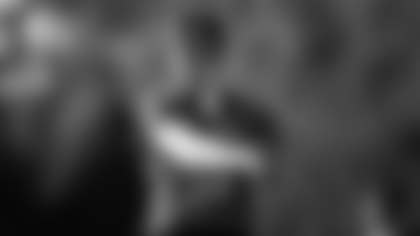5-2-01, 10:45 p.m.
Welcome to the Reds' locker room, which is suddenly anchored on a historic patch of turf at the corner of Cooperstown and Canton.
Especially when the estimable Marty Brennaman takes a break from being the Red Barber of his generation and pops down from the radio booth to get the lineup.
Where else in America do you have one Baseball Hall of Famer (Brennaman), two on the way (Ken Griffey Jr., and Barry Larkin) and a fourth outfielder named Deion Sanders who will go into the Pro Football Hall of Fame five years after he bumps and runs his last receiver?
But a day after electrifying Cincinnati, baseball and conventional wisdom, Sanders wanted no part of putting the NFL on its ear, too.
"I'm not talking about that other sport," said Sanders Wednesday, hiking the land's most famous baseball socks higher than where he took the Cinergy Field crowd Tuesday night with his three hits.
But this question intrigued Sanders.
Could Sanders, the Pro-Bowl-shut-down-Neon-Deion cornerback, cover Griffey, the former Moeller High School wide receiver the Bengals think could have gone pro?
"That's a tough question for me to answer," Sanders said. "I can't do it. I'm only thinking about one thing now and that's doing this."
Sanders plays two pro sports like the rest of us sign up for the YMCA. When he drilled a single and homer on the first two big-league pitches he'd seen in four years Tuesday night, guys like Griffey and Larkin, guys who maybe-could-have-would-have, shook their heads.
They like football, were good at it, and maybe could have. But. . .
"He's a cornerback, it's a little bit different than a receiver," said Griffey, with what appeared to be a tongue in cheek. "Because he does all the hitting."
Reminded that some in the NFL can't remember when Sanders last hit somebody, Griffey said, "If he decided to hit, if he wanted to hit somebody, he can hit. Me, I have no choice. Being a receiver, they can hit you at anytime."
The guy who could hit was Larkin, the other Moeller football player on the Reds. Bengals President Mike Brown, a Reds fan
who admires Larkin, said the club even toyed with taking Larkin late in the draft the year he was to get out of the University of Michigan.
"He knocked your teeth loose," said Jim Lippincott,
the Bengals director of pro/college personnel who coached that Moeller defense of the early '80s.
"He was extremely instinctive and very physical, an excellent tackler and fast."
Larkin was good enough that he accepted a ride to the Ann Arbor palace with the idea of playing football after he red-shirted his freshman year and took a swing at baseball.
He never went back. And Lippincott remembers a growling legend in the Michigan baseball stands as football coach Bo Schembechler kept urging Larkin to come back.
"The dudes were too big and fast," Larkin says now. "I thought I would just give baseball a shot. If I missed football as Bo told me I would, then I could possibly play my second through my fifth year.
"But I didn't miss it. I played well in baseball," Larkin said . "Along with my parents, I decided to go with baseball 100 percent instead of wavering on both fronts."
Larkin has survived the pounding of turf, dirt, spikes, and two decades with a frosty grace that includes an enormous ability to heal quickly.
But he just doesn't see himself doing it in the NFL.
"I could hit, but that was in high school when I was a buck 80 sopping weight and hitting guys my own size," Larkin said. "I couldn't imagine playing in the NFL or college and coming up to smoke some of those babies weighing 240 pounds. If I played, I would have been on a strength program, but I don't know how long I would exist in that environment."
Told part of the scouting report on him is that he was smart, Larkin laughed and said, "I would have been smart enough to avoid contact, that's what I would be smart at."
All of which boggles Larkin's mind when it comes to Sanders.
"There's no question about it, he's a marvel," Larkin said. "It takes a special breed to play that sport. "
Griffey followed Larkin a few years later at Moeller and was a junior on the 1985 state championship team. Lippincott said he was the best high school receiver he's ever seen.
And then at one practice before the state title game at the University of Cincinnati, Griffey teed up a ball at the 50-yard line and kicked it off the wall of one of the buildings ringing Nippert Stadium.
"He could have kicked it on a towel if you asked him," Lippincott said.
A pro receiver? A pro kicker? The man who will dethrone Hank Aaron as the home run king could hit the long ball in football, too.
"Frankly, I think he could have done anything athletically that he wanted," Lippincott said. "He just picked baseball. I remember one time he picked up a soccer ball, put it between his elbows, stood flat-footed, and dunked it."
Griffey's favorite route was the hitch pattern, where the quarterback took three steps and hit him quickly, so Griffey could make the run after catch.
Problem was, Griffey says, "I don't like to get hit much. All my friends played football for the first couple of years and after that, it was baseball.
"It just wasn't going to happen," said Griffey of a football career. "I weighed a buck 40."
Griffey figured football was even more out of the question that senior year, when he put on 50 pounds.
"I was uncoordinated," Griffey said. "That will happen when you grow six inches."
Lippincott figures if Griffey had played his senior year in '86, Moeller would have won back-to-back state titles.
OK, so Sanders won't say. But what if Larkin covered Griffey one-on-one?
"Griffey would get a little separation," Lippincott said. "But Larkin would have closed the cushion and probably knocked the ball down."
Larkin wanted an instant replay.
"No way," he said. "He'd get no separation and I wouldn't knock it down. I'd intercept it and take it to the house."
At the other end of Cooperstown and Canton, the man they marvel did answer one football question when it came to Griffey and Larkin.
"I think," Sanders said, "they made the right decision."





